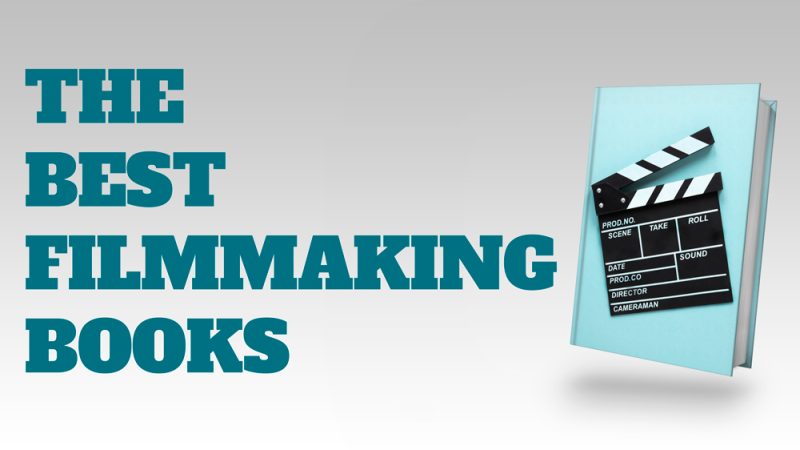
The Best Filmmaking Books
If you’re an aspiring filmmaker or just someone who loves cinema, diving into the world of filmmaking books can be a game-changer. These books not only cover the technical aspects of making movies but also delve into the art and creativity that go into crafting a cinematic masterpiece. Whether you’re interested in screenwriting, cinematography, or the business side of the film industry, there’s something here for everyone. Let’s explore some great reads that can truly enhance your filmmaking journey.
Please be aware we may have affiliate links to some of the books listed below.
Why Read Books on Filmmaking?
Reading books on filmmaking is essential for anyone looking to sharpen their skills and gain insights into the filmmaking process. They provide a wealth of knowledge that can help new filmmakers understand the intricacies of film theory, cinematography, and screenwriting. Plus, they offer behind-the-scenes looks at iconic films and the creative minds that have shaped the industry. By diving into these books, aspiring filmmakers can learn from the greats and find inspiration to create their own feature films.
Books about filmmaking can also serve as a crucial resource for film students, offering foundational theories and practical tips that help them succeed in film school and beyond. Whether you’re looking for guidance on video production, film editing, or storytelling, these titles often contain valuable information that helps you navigate the many facets of making movies. Overall, they are an investment in your craft that can pay off significantly in your filmmaking career.
Top Picks for Beginners
If you’re new to filmmaking, it’s crucial to start with the basics. There are many books out there that can guide you through the fundamentals of filmmaking. These books can help you understand the different aspects of filmmaking, from pre-production to post-production.
Here are three top picks for beginners:
- The Filmmaker’s Handbook by Steven Ascher & Edward Pincus
- Filmmaking for Dummies by Bryan Michael Stoller
- Directing: Film Techniques and Aesthetics by Michael Rabiger
These books are written in an accessible language, making them perfect for beginners. They cover a wide range of topics, including screenwriting, directing, cinematography, and editing.
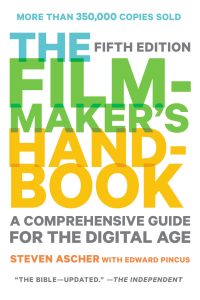
The Filmmaker’s Handbook by Steven Ascher & Edward Pincus
“The Filmmaker’s Handbook” is often called the bible of filmmaking. This book stands out for its comprehensive approach, covering every aspect of the filmmaking process. From scripting to shooting, editing, and distribution, it offers practical advice that filmmakers can apply to their projects. The authors, Steven Ascher and Edward Pincus, have curated a wealth of insights that make this guide invaluable for both beginners and seasoned filmmakers. The detailed explanations, combined with helpful diagrams and illustrations, help demystify the technical aspects of filmmaking.
Moreover, this book also discusses emerging technologies and trends in the industry, making it relevant even as the landscape of cinema evolves. With its reader-friendly format, “The Filmmaker’s Handbook” is designed not just to inform but to inspire. It’s a must-have for anyone serious about learning the craft of filmmaking, ensuring readers are well-equipped to tackle their first film projects with confidence. This book is indeed one of the best filmmaking books you can find, catering to a diverse audience of film buffs and aspiring filmmakers alike.
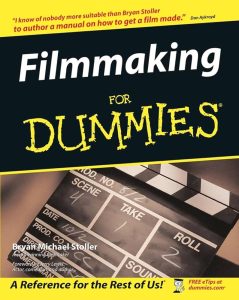
Filmmaking for Dummies by Bryan Michael Stoller
“Filmmaking for Dummies” is a fantastic entry point for those new to the world of cinema. Bryan Michael Stoller breaks down the complexities of making movies into simple, digestible concepts, making it perfect for beginners. The book covers everything from developing a script to understanding the cameras and equipment needed for video production. Stoller’s informal and engaging writing style makes the learning process enjoyable, ensuring readers stay engaged from the first page to the last.
One of the standout features of this guide is the wealth of practical tips and real-world advice Stoller shares from his experience in the film industry. He discusses the importance of networking, budgeting, and even how to navigate film festivals, which can be invaluable for aspiring filmmakers trying to make a name for themselves. By the end of this book, readers will not only have a solid understanding of the filmmaking process but also feel inspired to start creating their own cinematic works.
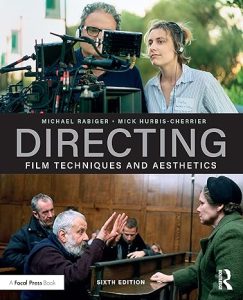
Directing: Film Techniques and Aesthetics by Michael Rabiger
Michael Rabiger’s “Directing: Film Techniques and Aesthetics” is a must-read for anyone serious about directing. This book delves deep into the role of the director, exploring the artistic choices involved in making movies. Rabiger emphasizes the importance of storytelling, character development, and the emotional impact of film, making it an essential read for budding directors who aspire to create meaningful cinema. The book combines theoretical insights with practical exercises that encourage readers to apply what they learn to their own projects.
Additionally, Rabiger discusses the collaborative nature of filmmaking, emphasizing how directors work with cinematographers, actors, and editors to bring their vision to life. This holistic approach helps aspiring filmmakers understand the dynamics of a film set and the importance of teamwork in the filmmaking process. By providing valuable insights and exercises, “Directing: Film Techniques and Aesthetics” equips readers with the tools they need to develop their unique directorial style and navigate the challenges of the industry.
Must-Reads for Screenwriting
Here are two must-reads for screenwriting:
Screenwriting is a vital part of filmmaking. It’s the foundation upon which the entire film is built. A well-written script can make or break a film. Therefore, it’s essential to learn the art of screenwriting.
- Save the Cat! by Blake Snyder
- Story by Robert McKee
These books offer valuable insights into the craft of screenwriting. They provide practical advice on how to create compelling characters, develop engaging plots, and write dialogue that resonates with audiences.
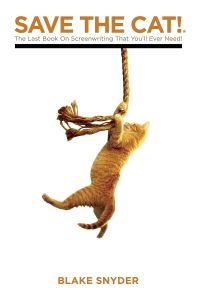
Save the Cat! by Blake Snyder
“Save the Cat!” by Blake Snyder is one of those books that every aspiring screenwriter needs in their toolkit. Snyder introduces a unique storytelling method that focuses on creating relatable characters and compelling plots. The title refers to a narrative technique where the protagonist does something likable early on, making the audience root for them. This approach is not just theoretical; Snyder provides practical advice and templates that help writers structure their screenplays effectively. His informal, witty writing style makes it a fun and engaging read, ensuring that writers of all levels can benefit from his insights.
What sets “Save the Cat!” apart is its practicality. Snyder doesn’t just offer abstract concepts; he gives readers concrete tools and examples that they can apply to their own projects right away. The book is filled with anecdotes from Snyder’s own experiences in Hollywood, making it relatable and inspiring. For anyone looking to break into the film industry as a screenwriter, this is undoubtedly one of the best filmmaking books to consider. It’s a fantastic resource that can help you write your first film with confidence and skill.
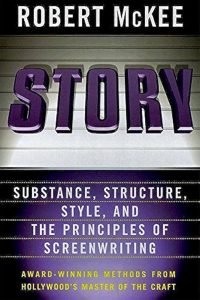
Story by Robert McKee
Robert McKee’s “Story” is often hailed as the definitive guide to storytelling in film. McKee dives deep into the mechanics of narrative structure, character development, and the emotional impact of storytelling. His insights are not just theoretical; they are grounded in the realities of successful storytelling in cinema. McKee emphasizes that every screenwriter must understand the audience’s emotional journey, making this book essential for anyone looking to write impactful screenplays.
What makes “Story” particularly effective is McKee’s ability to break down complex concepts into understandable ideas. He uses examples from a wide range of films, analyzing what works and what doesn’t in storytelling. This approach not only educates aspiring filmmakers but also inspires them to think critically about their own writing. McKee’s passion for storytelling shines through, making this book a must-read for anyone serious about screenwriting. If you aspire to create memorable films, adding “Story” to your collection is an absolute necessity.
Deep Dives into Cinematography
Cinematography is the art of visual storytelling. It’s about how the camera captures the scenes and how the images are presented. It’s a crucial aspect of filmmaking that can greatly influence the audience’s experience.
Here are two books that offer deep dives into the world of cinematography:
- Cinematography: Theory and Practice by Blain Brown
- The Five C’s of Cinematography by Joseph V. Mascelli
These books provide a comprehensive understanding of cinematography. They cover everything from camera techniques to lighting and color theory. They’re perfect for those who want to master the visual aspect of filmmaking.
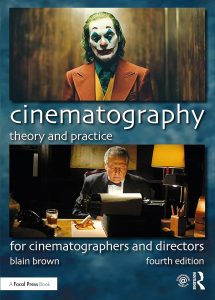
Cinematography: Theory and Practice by Blain Brown
“Cinematography: Theory and Practice” by Blain Brown is a comprehensive guide that covers the essential elements of cinematography in a way that’s easy to digest. Brown explores various camera techniques, lighting setups, and the artistic choices that can greatly affect the final look of a film. The book is laden with illustrations and examples from actual films, helping readers visualize the concepts being discussed. This resource is not just for cinematographers; it’s valuable for any filmmaker who wants to understand the visual language of cinema.
Brown also emphasizes the importance of collaboration in the filmmaking process, discussing how cinematographers work closely with directors and production designers to achieve a unified vision. He provides insights into the practical side of cinematography, including gear selection and budgeting, which are crucial for filmmakers working on low-budget projects. By reading this book, aspiring filmmakers can gain the knowledge and skills needed to create cinematic visuals that resonate with audiences, making it one of the best filmmaking books available.
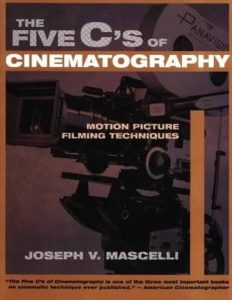
The Five C’s of Cinematography by Joseph V. Mascelli
Joseph V. Mascelli’s “The Five C’s of Cinematography” is a classic text that every aspiring cinematographer should read. The book breaks down the fundamental components of cinematography into five key elements: camera angles, continuity, cutting, close-ups, and composition. Mascelli expertly explains how these elements work in harmony to create compelling visuals that enhance storytelling. The practical examples and clear illustrations make it easy for readers to grasp complex concepts and apply them to their own filmmaking projects.
This book is particularly beneficial for beginners who are just starting to explore the world of cinematography. Mascelli’s straightforward approach allows aspiring filmmakers to build a strong foundation in visual storytelling. By mastering the five C’s, readers can improve their skills and increase their confidence in their ability to create visually stunning films. With its timeless insights and practical advice, “The Five C’s of Cinematography” remains one of the best filmmaking books to help you elevate your craft.
Insights from the Directors’ Chair
Directing a film is a complex and challenging task. It requires a deep understanding of storytelling, cinematography, acting, and many other aspects of filmmaking. But it’s also a highly rewarding job that allows you to bring your creative vision to life.
Here are two books that offer valuable insights from the director’s chair:
- Making Movies by Sidney Lumet
- On Directing Film by David Mamet
These books are written by renowned directors who share their experiences and wisdom. They offer a unique perspective on the art and craft of directing.
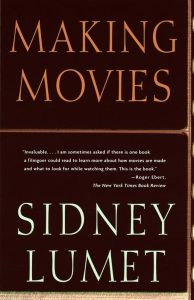
Making Movies by Sidney Lumet
This book is not just about the technical aspects of directing; it also delves into the emotional and psychological sides of filmmaking. Lumet discusses the importance of understanding the material and finding a unique vision for each project. Aspiring filmmakers will find inspiration in Lumet’s passion for storytelling and his dedication to his craft. “Making Movies” is a must-read for anyone looking to gain insights from a master director and understand the intricacies of the film industry.
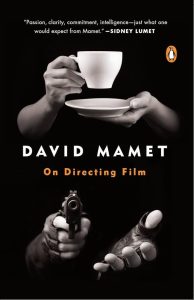
On Directing Film by David Mamet
David Mamet’s “On Directing Film” is a thought-provoking examination of the principles of directing. Mamet, a celebrated playwright and filmmaker, shares his unique perspective on the craft, emphasizing the importance of storytelling and the director’s role in conveying a film’s narrative. He challenges conventional wisdom and encourages aspiring filmmakers to strip down their stories to their essential elements. This book serves as a guide for those who want to understand the deeper meanings behind cinematic storytelling.
Mamet’s writing is concise and impactful, making it accessible for readers at any level of experience. He provides practical insights that filmmakers can apply to their own projects, focusing on the importance of clarity and simplicity in storytelling. By reading “On Directing Film,” aspiring filmmakers will gain a deeper appreciation for the art of directing and be inspired to develop their unique voice in the film industry. It’s an essential addition to any filmmaker’s library as it encourages critical thinking about the director’s responsibilities and the storytelling process.
The Business of Filmmaking
Filmmaking is not just an art, it’s also a business. Understanding the business side of filmmaking is crucial for anyone who wants to make a career in the film industry. This includes knowledge about financing, distribution, marketing, and legal issues.
Here are two books that provide valuable insights into the business of filmmaking:
- The Producer’s Business Handbook by John J. Lee Jr. & Anne Marie Gillen
- The Independent Film Producer’s Survival Guide by Gunnar Erickson, Harris Tulchin & Mark Halloran
These books offer practical advice and strategies for navigating the complex world of film business.
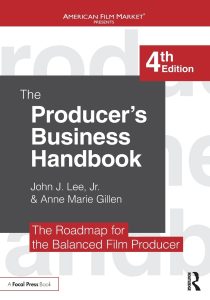
The Producer’s Business Handbook by John J. Lee Jr. & Anne Marie Gillen
“The Producer’s Business Handbook” is an invaluable resource for aspiring filmmakers who want to understand the intricacies of film production. Lee and Gillen break down the roles and responsibilities of producers, offering a comprehensive guide to the financial and logistical aspects of making movies. From budgeting to distribution, this book covers all the essential elements that filmmakers need to know to bring their projects to life. The authors also share industry insights and practical tips that can help readers navigate the complexities of the film business.
This handbook is particularly beneficial for those who aspire to work in independent filmmaking, as it addresses the unique challenges faced by low-budget productions. By focusing on practical strategies and real-world examples, Lee and Gillen empower readers to take charge of their filmmaking journey. Understanding the business side of filmmaking can significantly enhance a filmmaker’s ability to succeed in a competitive industry, making this book a must-have for anyone serious about their craft.
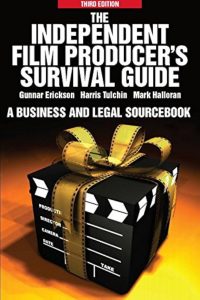
The Independent Film Producer’s Survival Guide by Gunnar Erickson, Harris Tulchin & Mark Halloran
“The Independent Film Producer’s Survival Guide” is a treasure trove of information for filmmakers looking to make their mark in the independent film scene. The authors, Gunnar Erickson, Harris Tulchin, and Mark Halloran, share their extensive knowledge and experiences, guiding readers through the often-challenging landscape of independent filmmaking. This book is filled with practical advice on securing funding, navigating film festivals, and building a distribution strategy, making it an essential resource for budding producers.
What sets this guide apart is its focus on the realities of producing low-budget films, which can be daunting for first-time filmmakers. The authors offer tips on how to maximize resources and make the most of limited budgets. By providing insights into the independent film industry and its unique challenges, this book empowers aspiring filmmakers to take control of their projects and successfully bring their visions to life. For anyone looking to produce their first film, this guide is an indispensable tool that can help them navigate the complexities of the business side of filmmaking.
FAQ
Q: What are some must-read books for aspiring filmmakers?
A: If you’re looking to dive into the world of cinema, check out “Rebel Without a Crew” by Robert Rodriguez, “In the Blink of an Eye” by Walter Murch, and “Making Movies” by Sidney Lumet. These books are worth your time and will help you master the craft of filmmaking!
Q: Are there any biographies of famous filmmakers that I should read?
A: Absolutely! You should check out the biographies of directors like Spike Lee and Francis Ford Coppola. They offer amazing insights into their creative processes and the challenges they faced throughout their careers.
Q: What’s the best way to learn about cinematic storytelling?
A: One of the best resources is “The Visual Story” by Bruce Block. This book takes the reader through the principles of cinematic storytelling, making it a great guide for anyone wanting to make a movie that resonates with audiences.
Q: What about books focused on film editing? Any recommendations?
A: For film editing, “In the Blink of an Eye” by Walter Murch is a classic. This page-turner explores the art of editing and provides practical tips that every filmmaker should know.
Q: Can you recommend any how-to guides for video production?
A: Definitely! “The Filmmaker’s Handbook” is a comprehensive guide to film and television production that’s perfect for beginners and seasoned filmmakers alike. It covers everything from pre-production to editing!
Q: What is the importance of studying film history for aspiring filmmakers?
A: Understanding film history is crucial for any aspiring filmmaker. It helps you learn from the greats, like Kubrick and Spielberg, and see how their techniques shaped the cinematic landscape. Plus, it can inspire your own work!
Q: Are there any great books on making documentaries?
A: Yes! “Documentary Storytelling” by Sheila Curran Bernard is an excellent resource for anyone interested in creating compelling documentaries. It offers practical advice and insights into crafting engaging narratives.
Q: What role do cast and crew play in the filmmaking process?
A: The cast and crew are essential to the filmmaking process! A solid team can make or break your project. It’s important to read books that discuss team dynamics and collaboration in filmmaking to understand how to work effectively together.
Conclusion: Building Your Filmmaking Library
Creating a solid filmmaking library is essential for anyone aspiring to make movies. The best filmmaking books provide invaluable insights, techniques, and inspiration that can shape your creative journey. From the technical aspects of cinematography and screenwriting to the business side of filmmaking, each of these titles offers unique knowledge that can enhance your understanding of the craft. Building your library with these essential reads will empower you to tackle your first film projects with confidence and creativity.
As you explore these books, remember that filmmaking is a continuous learning process. The more you read and engage with the material, the more proficient you’ll become in your craft. Whether you’re interested in directing, producing, or screenwriting, there’s no shortage of great resources available. By investing time in these books, you’re laying the groundwork for a successful career in the film industry, and who knows, you might just create the next groundbreaking feature film that captivates audiences around the world.

